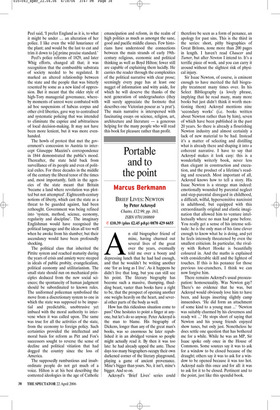Keeping the best of order
Ben Wilson
A MAD, BAD AND DANGEROUS PEOPLE? ENGLAND 1783-1846 by Boyd Hilton
OUP, £30, pp. 757, ISBN 0198228309
✆ £24 (plus £2.45 p&p) 0870 429 6655 The preceding volume in the New Oxford History of England, covering the years 1727-1783, described the people as ‘polite and commercial’. Boyd Hilton does not imbue their sons and daughters with Byronic qualities, as his title might suggest; rather, it expresses the extreme volatility of the period. In the 1820s 60 per cent of the population were no older than 24. This generation had known little respite from war and its dismal aftermath, frequent and biting economic depressions, scarcity of food and recurrent unrest. Malthus’s warning of the destructive power of population growth and millenarian prophecies of the Apocalypse offered scant reassurance.
The 63 years from the loss of the American colonies to the repeal of the Corn Laws represents, for Hilton, a distinct period in which fear of ‘a mad, bad and dangerous people’ haunted the imaginations of polite and respectable people. It was only the failure of Chartism and revived confidence in an imperial destiny that dissipated these anxieties and the English ‘woke up, as it were one morning, to find themselves respectable’. In their own minds, at least, they had the moral authority to govern one quarter of the world’s population. The country had also reaffirmed its position as the wealthiest country in the world; but success was, as this book makes clear, ‘a damned close run thing’.
Hilton backs away from the idea that the country altered beyond recognition. An English Rip van Winkle who slept through the period the book covers, he believes, would not have felt out of place. Yet fear of revolution, crime and the noxious habits of the ‘dangerous classes’ radically altered mentalities, particularly notions of liberty. A professional, uniformed police force, for example, was regarded in the earlier period as incompatible with freedom and alien to the national character; toleration of a rude and coarse people with all their antisocial ‘sauciness’ was the price a nation had to pay for its freedom. As late as 1824 Peel said, ‘I prefer England as it is, to what it might be under ... an alteration of her police. I like even the wild luxuriance of the plant; and would be the last to cut and trim it down to [a] prime precise standard.’ Peel’s police reforms of 1829, and later Whig efforts, changed all that; it was recognition that the combustible substrata of society needed to be regulated. It marked an altered relationship between the state and the people that was bitterly resented by some as a new kind of oppression. But it meant that the older style of high-Tory managerial governance, whereby moments of unrest were combated with ad hoc suspensions of habeas corpus and other civil liberties, gave way to centralised and systematic policing that was intended to eliminate the caprice and arbitrariness of local decision-making. It may not have been more lenient, but it was more evenhanded.
The howls of protest that met the government’s concession to Austria to intercept Giuseppe Mazzini’s correspondence in 1844 demonstrated the public’s mood. Thereafter, the state held back from surveillance of its people and even of political exiles. For three decades in the middle of the century the liberal tenor of the times and, most importantly, faith in the agencies of the state meant that Britain ‘became a land where revolution was plotted but not attempted’. Eighteenth-century notions of liberty, which cast the state as a threat to be guarded against, had been rethought. Government was being refined into ‘system, method, science, economy, regularity and discipline’. The imaginary Englishman would have recognised the political language and the ideas all too well when he awoke from his slumber; but their ascendancy would have been profoundly shocking.
The political class that inherited the Pittite system and reached maturity during the years of crisis and anxiety were steeped in ideals of public probity, evangelicalism, political economy and utilitarianism. The small state should run on mechanical principles deduced from the new social sciences; the spontaneity of human judgment should be subordinated to known rules. The uniformed policeman symbolised the move from a discretionary system to one in which the state was supposed to be impartial and predictable, unobtrusive yet imbued with the moral authority to intervene when it was called upon. The same was true for all the activities of the state, from the economy to foreign policy. Such certainties provided the intellectual and moral basis for reform as Pitt and Fox’s successors sought to reverse the sense of decline and political vitiation that had dogged the country since the loss of America.
The supposedly rumbustious and insubordinate people do not get much of a voice. Hilton is at his best describing the contested ideologies in the age of Catholic emancipation and reform, in the realm of high politics as much as amongst the sane, good and pacific middle classes. Few historians have understood the connections between the main strands of early 19thcentury religious, economic and political thinking as well as Boyd Hilton; fewer still are capable of explaining them lucidly. He carries the reader through the complexities of the political narrative with clear prose; seemingly every page has at least one nugget of information and witty aside, for which he will deserve the thanks of the next generation of undergraduates (they will surely appreciate the footnote that describes one Victorian poseur as ‘a prat’). The main narrative is interspersed with fascinating essays on science, religion, art, architecture and literature — a generous helping for the many people who will read this book for pleasure rather than profit.



































































 Previous page
Previous page